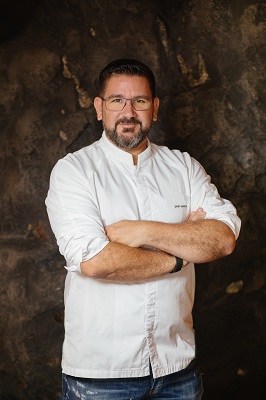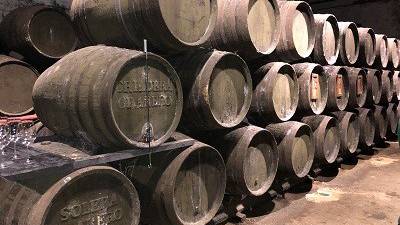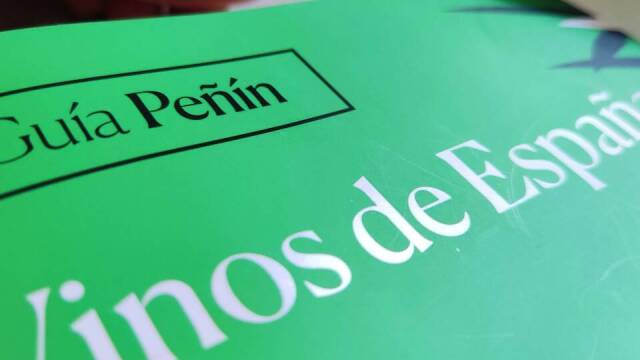“In our wine menus you can drink something much more affordable but of quality”
Q.- The relationship between gastronomy and wine is very relevant in your projects with very extensive wine lists. Do you think that such complete lists have a place in future restaurants?
A.- We have a tendency to get as close as possible to offering an experience relatively close to the world of haute cuisine but at a much more affordable price, which does not mean that, as in our food menus, we are always looking for a balance in which the customer can adapt to the price he/she wants. For example, at Leña you can eat for 40 euros or 80 euros depending on your choices. In the end it is a question of balance and we also like to take that to the wine menus, where you can drink something much more affordable but of quality, just as we do with the roast chicken at Leña, where we look for the best chicken, the best raised, the best possible technique so that it is as juicy as possible. The same as with wines, we look for affordable wines that are good and tasty, but we also give the customer the option of choosing a Toma Hawk and a foie gras with white truffle on top, and they can also have access to this menu, which is not usual in places with an average price of 40 to 60 euros.
Q.- What is a fair price for a wine in a restaurant? Why is there so much difference?
A.- For us, it depends on what you get, that is the fair price. The fair price depends on what you give. That's what I always say, there are many people who criticised me for making the hamburger with McDonald's. What I try to do is to make the best hamburger I can. My aim is to make the best burger you can find for 9, 8 or 7 euros, it's a question of value for money, and that's the best fair price, that the value for money is right.
Q.- At what point does wine come into play when it comes to creating a restaurant menu? Do you have to create the gastronomic offer and then fill in the gaps with related wines?
A.- I think so. A menu like, for example, Lobito de Mar, where 80% is focused on fish and seafood, must be different from a menu at Leña, where the focus is on meat. It also depends on where you are. Our wine list at Bibo restaurant in Doha (Qatar) is not the same as Bibo Madrid, nor is it the same as Bibo Marbella. Each menu, depending on each cuisine, adapts and flows depending on what is gastronomically speaking.
Q.- Do you ever create a dish with a particular wine in mind?
A.- Well, yes, I have a case where it is not with a wine but with a spirit. In the restaurant Leña we make a Baba and you choose the type of rum you want, with greater or lesser age and of lesser or greater price. We do a lot of things. We do pairing games. Bear in mind that we still have that touch, that feeling of haute cuisine, so we do offer that added touch of something different to people who fancy it.
“To compete (the wine bussines) have to adapt much more to what an international market demands”
Q.- Why is Spanish gastronomy so successful and why doesn't it have a knock-on effect with wine, as happens with Italian gastronomy?
A.- It is difficult. I think Spanish gastronomy triumphs, but it should triumph much more. I think we lack open-mindedness. We have to be able to adapt and understand that what is 100% purely our own is not necessarily what works abroad and seek a balance in this aspect. In the world of wine, as in the world of olive oil, this is what happens a little bit: why is it that when you go to a supermarket in the United States, you find 10 Italian oils and two Spanish ones, when Spanish oil is obviously much better? Maybe these are worlds that lack that open-mindedness. It is a question of seeing and appreciating the brutal and fierce competition abroad and that in order to compete you have to adapt much more to what an international market wants and demands. I'm not just talking about the liquid itself, but the brand, the marketing and everything that surrounds it: the bottle, the label, the name, everything...
Q.- If you had to choose a type of wine, which one would you choose? What is your relationship with sherry wines?
A.- Personally, I drink very little, but what I like most are wines with a sweet tendency. Wines from Malaga such as Molino Real, and if we go upwards, then Chateau d'Yquem (Sauternes), late harvests, wines with botrytis... wines that for me are sweets and are quite pleasant. And then Champagne, which is one of the things I like the most, and the older the better, to be honest.
Q.- In many of your wine lists there is an important presence of Champagne and Manzanilla and Jerez wines.
A.- Because we are Andalusian. On a personal level, I always liked sherry with perfume for cooking. The palos cortados, the olorosos, are wines that I have always used in cooking. And I have used them as if they were just another ingredient, as they are extremely aromatic and special. Oloroso with seafood, palo cortado with foie gras or hunting. I like them and I am Andalusian, and it is also something unique, so it seems logical and sensible to use it as much as possible. I can also tell you that we use these wines on our menus in a way that no other restaurant group does, they are wine lists that can be found in Michelin star restaurants and more.
"(Sherry wines) don't suit everyone's palate, probably a little due to ignorance and lack of knowledge”
Q.- What do you think is wrong with Jerez and Manzanilla de Sanlúcar, why, being unique wines, aren't they hooking the general consumer? Does something similar happen with any particular foodstuff, which is particularly good but which doesn't really catch on with the public because of its complexity?
A.- I think they are wines that are not for everyone. It is true that they are unique, but this peculiarity does not suit everyone's palate, probably a little due to ignorance and lack of knowledge of what it is, how it comes and how it is made... Just as it seems that everyone has a certain wine culture, whether it is a coupage, whether it is made from a certain type of grape, the world of sherry is much more unknown and it is probably this lack of knowledge and this peculiarity in the mouth, this dryness, a little more complex to understand. If we could explain it better, we would also do better.
Q.- Is there any comparison in the world of gastronomy? An exquisite product that not everyone understands because of its complexity?
A.- Imagine elvers or barnacles, not everyone understands them. Just like what happens to us when we receive certain things from abroad. The rotten egg or Millennium Egg from China seems to them to be a real wonder and not everyone here likes it. Or Fugu (puffer fish) with its texture. These are things that, for example, I, who am lucky enough to have been there and to have taken an interest, end up appreciating. But most people, when they taste it, think " I don't understand why it's such a big deal...". We always miss nuances. For the Japanese, for example, it also has a spiritual part, which brings poison... in life, in general, the better you explain something, the easier it is to understand and appreciate.
Q.-What relevance does wine have in the home-delivery food project La Gran Familia Mediterránea?
A.- This is one of the things we are considering. We sell interesting things, although it is always true that it seems that everyone has their own little wine cellar at home. But yes, as a future option, we are considering increasing our offer somewhat. In this line, we have included in the menu something that we wanted because we believe that it is also necessary to offer it, even though we think that, just as people do not ask for water or a soft drink because they already have it at home, the same thing can happen with wine.

 Log in
Log in







